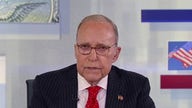Today's disappointing employment report shows that private sector jobs have been essentially flat over the past three months, while manufacturing employment has actually declined modestly in the last four months. It's a stall speed jobs report, to use Chris Waller's phrase, but it's not a recession report.
Business investment in capital goods and factory orders are booming. And in a few months, middle income workers will reap the benefits of Trumpian tax cuts on tips, overtime, and social security benefits. As I have suggested, the economy, both present and future, is stronger than folks may think.
Unsurprisingly, President Trump responded with a brief Truth Social, saying "Jerome 'Too Late' Powell should have lowered rates long ago. As usual, he's 'Too Late!'" Hopefully "Too Late" Powell will get the Fed's fund target rate down to 3% from its current 4.5% by the end of this year. But the bigger story is perhaps best summarized in the Wall Street Journal headline, "Trump Is Making Strides In His Takeover of the Fed", as CEA Chair Stephen Miran is taking a leave of absence in order to temporarily fill a Fed seat on the Board of Governors. And another Wall Street Journal headline, "DOJ Opens Criminal Investigation into Fed's Cook, Issues Subpoenas," tells the sad tale of Fed member Lisa Cook's alleged repeated mortgage fraud lies, which has caused President Trump to fire her.
The upshot of all this is the likelihood that by year-end there will be four Trump appointees in the seven member Federal Reserve Board. In other words, a major change. And outlining what this major Fed change may look like is the opinion piece published this morning in the Wall Street Journal by Treasury Secretary Scott Bessent, "The Fed’s ‘Gain of Function’ Monetary Policy." It's a strong piece. Basically, Mr. Bessent argues that the Fed's monetary lab experiments of the past 15 years have gone badly wrong. They badly overreached their remit by monetizing huge budget deficits, repeatedly erring in their forecasts, failed to keep inflation down, overregulated, overstaffed, and over politicized.
The labor market is 'just fine,' says ex-Reagan economist
'Kudlow' panelists Art Laffer, Steve Moore and Jason Trennert discuss concerns about the state of the U.S. labor market and renewed calls for interest rate cuts.
In so doing, Powell and company have mangled Fed independence and credibility. Curiously, Mr. Bessent neglects to mention the dollar.
But what about King Dollar? Now strictly speaking, the dollar is the remit of the Treasury Department that Mr. Bessent runs. But of course, it's the Fed that controls the supply of the dollar. I would argue a steady and reliable King Dollar is the key to achieving price stability, and price stability is the key to achieving rapid economic growth and low unemployment.
However, pre-covid when measured against a basket of currencies such as the CRB commodity index, the dollar's value has fallen by about 35%. When measured against gold, the dollar's value has fallen by more than 125%. These are not sustainable trends if we hope to keep the greenback as the world's reserve currency. Mr. Bessent does mention the Fed's balance sheet, which is the key to creating or extinguishing dollars, but he never seems to mention the currency itself.
Hopefully, this failure will change when the Central Bank comes under new management.





